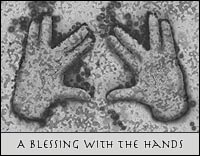

Jewish Symbols on Grave Monuments
Blessing With the Hands: Hands held in benediction are the symbol of the Cohens, members of the priestly family of the tribe of Levi. This symbol indicates that deceased’ decedent was kohein (Kohen), because this hand position is used when the kohanim would bless the congregation at certain times. The kohein is a descendant of Aaron, and of ancient priestly class, and charged with performing various rites in the Temple. This symbol does not make the deceased a Rabbi.
Crown: The crown is a symbol of the re-establishment of the kingdom of Judah. There are also three essential crowns: keter malchut -- the Crown of Kingship; keter Torah -- the Crown of Torah, and keter kehunah –- the Crown of Priesthood.
Deer: The deer is a reference to such Jewish names. The deer is a symbol of the tribe of Naphtali.
Lion: The lion is the symbol of the tribe of Judah. Certain Jewish names related to the Lion, so it may be reference to the name of the deceased.
Magen David, Star of David: This six-pointed star is the most recognized Jewish symbol. Magen David means “Shield of David.” The Star of David is is often is used on the gravemarker of a man.
Menorah: Usually refers to the nine-branched candelabrum used to hold the Chanukkah candles, but could be the seven-branched candelabrum used in the Temple. The nine-branched Menorah is closely associated with Chanukkah, it represents the miracle of the oil - in the Temple, a one day supply of lamp oil lasted nine days. The candelabrum (or a candle) is often is used on the gravemarker of a woman.
Offering Box: The offering box symbolizes the charity of the deceased or may refers to his office as treasurer.
Torah Scroll: “Torah” means “a teaching.” The Torah is God’s teaching to the Jewish people. It is the first five books of the Jewish Bible (called the Old Testament by Christians), Genesis, Exodus, Leviticus, Numbers, and Deuteronomy. It is written on parchment on scrolls and read from them in the synagogue. The Torah then is represented on gravemarkers as a scroll.
Ten Commandments: The Ten Commandments (Exodus 20:1-17) are represented on gravemarkers as two tablets.
Water Jug and Washing Bowl: The water jug and washing bowl is the symbol of the Levites, members of the priestly tribe of Levi. They have certain privileges in the synagogue service, one being the washing of the hands of the priest before the service.



